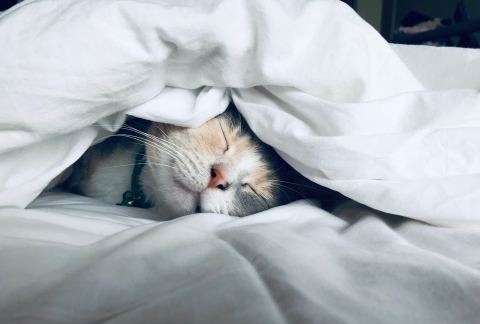6 Tricks to Help You Sleep Better While Traveling

For all the talk of living a healthy lifestyle these days, from working out in hotel gyms to eating better while on the road, sleep is an essential part of the wellness equation that often gets neglected.
There are many studies that show how vital sleep can be to your overall health. Getting enough sleep bolsters your physical and mental wellbeing, helps your brain function properly and improves learning and problem solving. Being sleep deprived has been shown to increase your risk for many serious health conditions, including heart disease, kidney disease, high blood pressure, diabetes, stroke and obesity.
It’s safe to say you already know how important it is to get enough sleep — seven to eight hours per day, according to the American Academy of Sleep Medicine — yet in the events industry, it’s easier said than done. Long days spent working at events and traveling from one destination to the next often make it difficult to get enough sleep, and that’s not even including factors such as stress that can make it hard to fall asleep in the first place.
You might think you can easily make up for lost hours on the flight home or squeeze in an afternoon nap the day you arrive somewhere. But unfortunately, there’s no such thing as catching up on sleep, says Nicole Kupish, a sleep coach and manager at Equinox in Chicago. “While taking a nap will reduce sleep drive and might momentarily increase concentration levels when you’re sleep deprived, naps cannot make up for the more complex functions of the brain that occur during a full night’s sleep,” she explains.
Crossing time zones can also wreak havoc on your internal sleep clock. For most people, it’s more difficult to travel east than to travel west, because it’s easier to extend your circadian clock than condense it, says Kupish. “For example, it’s much easier to stay up two hours later than usual when traveling west, and much harder to fall asleep two hours earlier if traveling east.”
It all sounds exhausting — so we talked with two sleep experts to learn how event professionals can prioritize sleep while traveling (or anytime, really) to maximize their health and optimize performance on the job.
Bring comfortable, or even luxurious sleepwear to make the experience of sleeping in a hotel feel special.
This is true even if you’d rather be at home, says Janet Kennedy, Ph.D., a licensed clinical psychologist also known as the NYC Sleep Doctor. “I particularly love the Cool Nights collection by Soma because the pajamas not only look and feel great, but they also keep you feeling cool,” she says. “That is especially important when you can’t control other factors like temperature consistency in the room, bed and pillow materials, and bedding, all of which can affect your body temperature regulation and sleep quality.”
Bring a good book to read before bed.
“It’s often hard to maintain bedtime routines on the road, but you can read anywhere,” says Kennedy. “Reading helps the brain to quiet down after a hectic day of information overload, and quieting the mind allows the body to relax and fall asleep.”
Skip the nightcap.
It’s tempting to overindulge in alcohol when traveling, but alcohol interferes with sleep quality, says Kennedy, fragmenting sleep and leaving you feeling sluggish and grumpy the next day.
Find ways to reduce stress at night.
If you pay attention to your stress levels throughout the day, they tend to be higher in the morning and lower at night, especially right before bed, says Kupish. But if you’re someone who tends to experience more stress before bedtime, you’ll likely have a tough time falling asleep. Try taking a warm bath, practicing meditation and breath work or doing light stretching to release tension before hitting the sheets.
Be prepared with a sleep mask, earplugs and white noise.
You never know when you will need them. “When sleeping in a new environment, your brain can stay on alert, responding to sounds that wouldn’t normally disrupt sleep at home,” says Kennedy. “White noise and earplugs give a sense of security that allows you to relax, knowing that you won’t be jolted awake every time someone shuts a door down the hall.”
Maintain consistent wake and bedtimes.
“This is the single best thing anyone can do for sleep,” says Kupish. Just as it's important to incorporate sleep schedules for children, adults too can benefit from this approach. When you maintain a consistent wake time, your body naturally becomes more alert around that time, and the same things happen at bed time — you’ll be more naturally become sleepy around your typical bedtime hour.


Add new comment